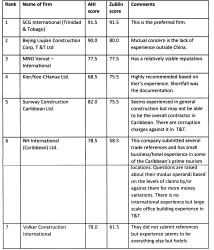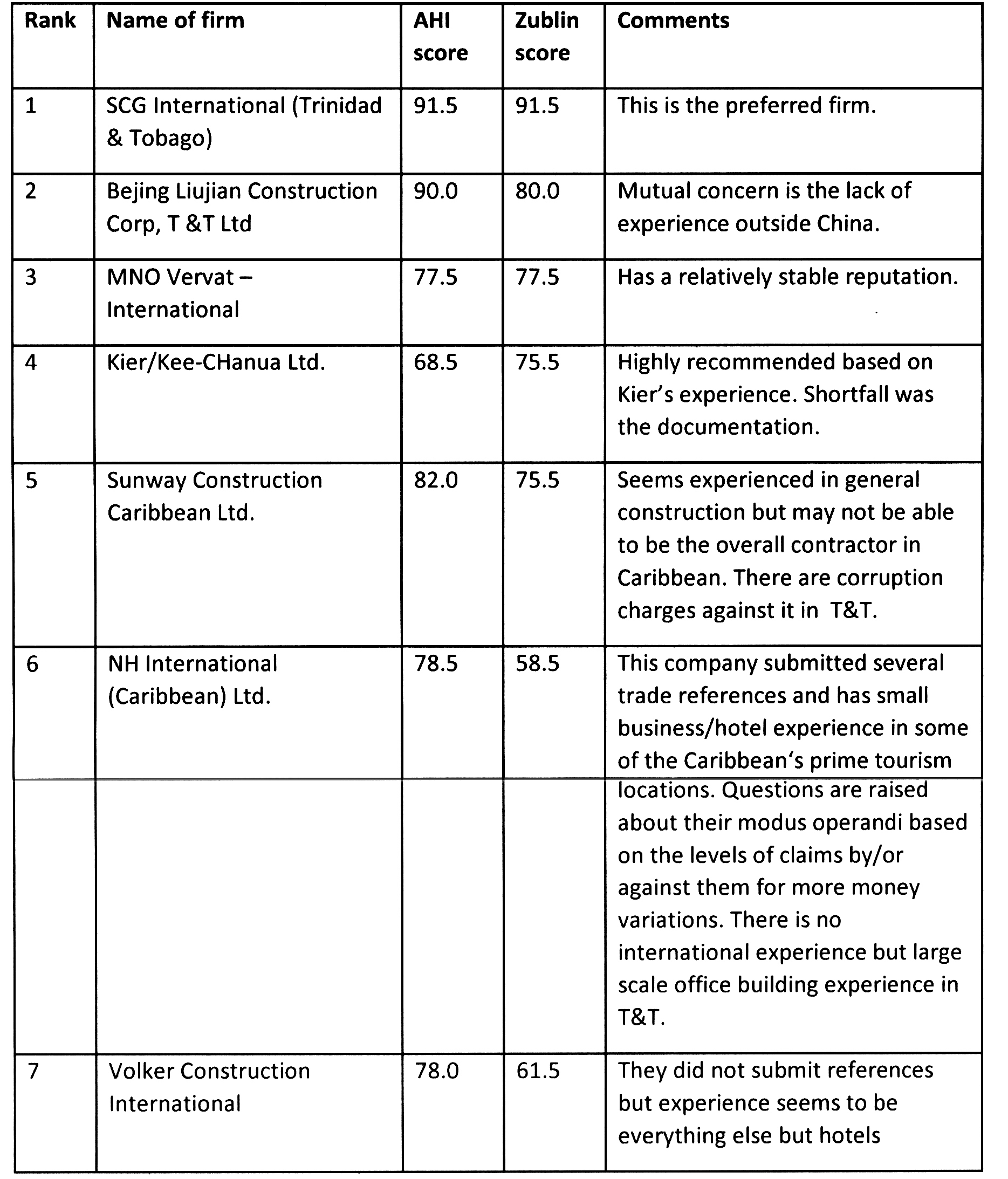The basis for the selection of the Marriott Hotel builder is unclear with government’s holding company NICIL refusing to provide information on the second-ranked bidder and it had also ruled out at least one reputable firm and given low marks to another, according to the forensic audit into the project.
In his report, forensic auditor Anand Goolsarran said that the selection of the contractor, Shanghai Construction Group (SCG) International (Trinidad and Tobago) Ltd, took place a time when the police in Trinidad were investigating the company for allegations of corruption and had raided its office and seized documents.
Further, he said, Atlantic Hotels Inc (AHI), the project’s special purpose company, was yet to provide documentary evidence about the second bidder’s original and revised bid prices as well as details of negotiations of the bidder, as was done in respect of SCG International. “Without such information the basis of the selection of the contractor could not be properly determined. The award of the construction contract for over US$50 million days before the 28 November 2011 and without prior Cabinet approval should also be a source of serious concern,” the former long-serving Auditor-General wrote in the report.
In giving the timeline for the selection of the construction contractor, the report pointed out that an expression of interest from qualified contractors was publicly advertised for the construction of a hotel and entertainment complex to be operated by Marriott International and built in accordance with Marriott standards. The closing date for the receipt of applications was 30 June 2010. Of the 23 local and foreign firms that applied for prequalification, seven firms were shortlisted based on the achievement of a score of above 60 points out of 100.
In terms of the evaluation criteria, 30 points were awarded for experience (including at least 10 years in regional and international projects and construction of two branded hotels), 25 points for financial capability (including bonding capacity, third party liability and other insurance, other liability, audited accounts), 25 points for references (minimum of five references from prior/similar projects; at least two other references e.g. from banks, trade etc.) and 20 points for track record in terms of delivery within stipulated timeframe.
Zublin Grenada Ltd
The report revealed that the prequalification was done internally by the staff of NICIL and by Zublin Grenada Ltd., the equity investor who had been initially identified to own 67% of the shareholdings of AHI.
The report said that in accordance with Section 24 of the Procurement Act 2003, public corporations and other bodies in which controlling interest vests in the State may, subject to the approval of the National Procurement and Tender Administration Board (NPTAB), conduct procurement according to their own rules and regulations, except to the extent that such rules and regulations conflict with the Act or the regulations, the Act and the regulations shall prevail. In addition, if funds are received from the Treasury for a specific procurement, then the corporation or other body shall be obliged to follow the procedure set out in the Act and the regulations. “Despite the size and complexity of its operations, NICIL does not have its own procurement rules, which is (a) key requirement of the Procurement Act. In the circumstances, it would have been more appropriate for NICL to involve NPTAB in the assessment of tenders received for the award of contracts, as is the case of other State institutions that do not have their own procurement rules and regulations,” Goolsarran declared.
The report said that NICIL’s executive director Winston Brassington contended that the opening of all bids is normally done in the presence of the staff of the Auditor General’s office and that NICIL carries out internal assessments before contracts are awarded. He further stated that NICIL staff would collect the bids received; review each bid submission for tender procedure compliance; and, where required, summarise key details of each bid. A paper is then prepared and presented to the various Boards and Cabinet for final decision.
“Mr Brassington’s response, however, did not address NICL’s failure to follow the requirement of Section 24 of the Act since the presence of the Audit Office at the opening of bids does not negate, or is not a substitute for, this requirement. In addition, internal assessments by the staff of NICIL lack the much-needed degree of independence, especially for a large project such as the construction of the Marriott Hotel,” Goolsarran asserted.
The report provided a summary of the results of the assessment of the firms that were prequalified:

The report pointed out that SCG International was awarded 91.5 points by both NICIL and Zublin and the only comment in the evaluation table was “This is the preferred firm.”
The report also said that some of the comments made in the right hand column also do not appear to be consistent with the points awarded.
Further, it said that one of the shortlisted firms, Sunway Construction Caribbean Ltd., was facing corruption charges in Trinidad and NICIL was aware of this during the prequalification exercise. The firm was, however, given the maximum points of 25 out of 100 for references, the report asserted.
It also pointed out that one reputable international firm, Ballast Nedam International, was not shortlisted. This firm was the contractor of the Mahaica-Mahaicony-Abary Drainage and Irrigation Scheme funded by the Inter-American Development Bank and the Government of Guyana in the sum of US$175 million. The Scheme was the largest drainage and irrigation project in South America at the time. The firm was also involved in feasibility studies for the Berbice River Bridge, the report noted.
In response, AHI said that, among others, Ballast Nedam is a civil contractor and not a hotel contractor.
Reputable
The report also noted that another reputable international firm, NH International (Caribbean) Ltd, although pre-qualified, was given a relatively low score. It was pointed out that in 2009, this firm won for the fifth time the prestigious Trinidad and Tobago Contractors’ award. In 2008, it had also built the Ocean’s Edge Resort in St Kitts and received very favourable ratings for the works undertaken. “The comments in the above evaluation table in relation to this firm give a different impression of the standing of this firm,” the report said.
The report recalled that on 23 January 2011, the shortlisted firms were invited to bid. The bids were opened in early May 2011, and according to information provided by AHI, there were only two bidders. However, the prices were significantly higher than the estimated construction cost of US$41 million. SCG International’s bid price was US$65 million.
“However, up to the time of reporting, AHI was yet to provide information on details of the second bidder’s original bid price,” the report said.
It pointed out that contrary to established procurement practices, AHI entered into negotiation with SCG, via a Memorandum of Understanding dated 14 June 2011 for the latter to submit an alternative design, “providing such design meets the full requirements of a Marriott International Design Standards, the contractual, technical and administrative requirements as set out in the original tender documents and the full functional requirements for a 197 room Marriott hotel and Entertainment Complex.”
The report reiterated that NICIL does not have its own procurement rules and regulations and therefore ought to have been guided by the requirements of the Procurement Act of 2003. “Section 41 of the Act states that there shall be no negotiation between the procuring entity and any of the bidders,” Goolsarran pointed out.
The report said that according to Brassington, “both tenderers indicated that with an alternative design, savings could be achieved with compromising the functional requirements sought. As such, they were allowed to submit revised proposals based on their alternate designs in mid May 2011. Again, SCG submitted the lowest price.”
Documentary evidence
The report pointed out that AHI, whose sole director for six years was Brassington, however had yet to provide information about the second bidder’s revised bid price as well as of documentary evidence of AHI’s negotiation with the bidder. “In the absence of this information, the basis of the award of the contract to SCG International could not be properly determined,” the report declared.
It also pointed to the allegations of corruption against SCG in Trinidad. AHI, in response, said that it was not aware that SCG was convicted for wrong-doing and that it could not disqualify the contractor on the basis of allegations.
The report also pointed out that Sunway Construction Caribbean Ltd. was reported to have sub-contracted work in the sum of TT$368 million to Times Construction Company Ltd., a company owned by the Managing Director of SCG International. It is not clear whether NICIL carried out the necessary due diligence and whether this matter was taken into consideration in the shortlisting exercise.
Based on the receipt of a revised tender from SCG International, AHI, represented by Brassington, entered into a contract with SCG on 16 November 2011 for the design and construction of the hotel in the sum of US$50.918 million.
“The size of the hotel was stated as 17,695 square meters, equivalent to 190,467 square feet, compared with 274,032 square feet reflected in the ADUA design that was advertised. This represents a 31% decrease in the size of the hotel,” the report revealed.
It also pointed out that the contract was signed just 12 days before the 28 November 2011 elections, which is not normal practice for such a large contract to be executed so close to national elections and this was done without Board or Cabinet approval.
The report also noted that in accordance with Clause 6 of the contract agreement with SCG International, “The contractor may import any personnel who are necessary for the execution of the works.” Implicit in this agreement is that only technical personnel whose skills are not available locally would be recruited from overseas. However, virtually all of SCG’s workforce came from overseas, the report noted.






